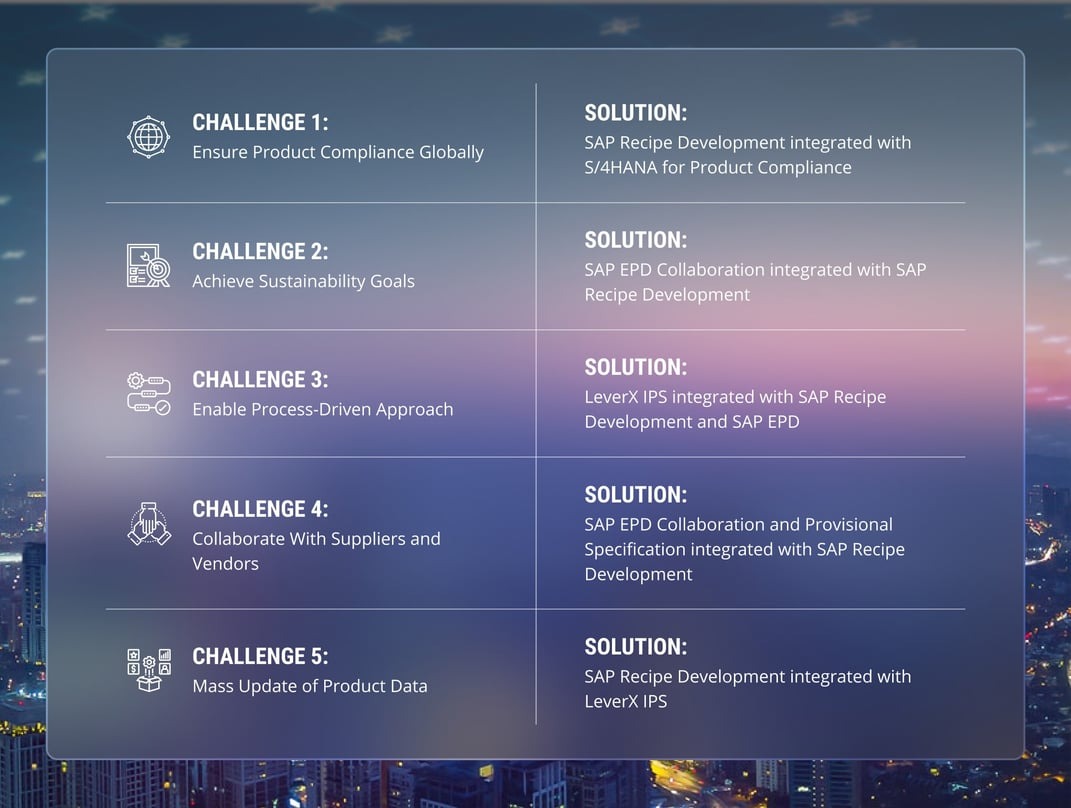The LeverX experts consider five key challenges manufacturers face and tell what solutions can address them.
5 Reasons to Use SAP Solutions for Enterprise Product Development in 2023
With the enterprise's growth, the interaction between the horizontal and vertical departments is getting more complex. The approval process may last months, leading to lost profit, resources, and motivation. The modern business approach must manage the increasing complexity of the product by introducing innovations into the development and ensuring transparent business processes and communication within the company.
Modern IT solutions can improve communication, decrease the number of production errors, reduce the product delivery time, and increase the loyalty of customers to your brand and product and, in general – help to contribute to your continuously sustainable development.
Looking back to last year, the LeverX experts, Natallia Arkhipava, Lead PLM/RD Consultant, and Darya Hauruseva, Lead EPD Consultant, consider five key challenges manufacturers face and tell how SAP Recipe Development, SAP Enterprise Product Development, and LeverX IPS solutions can address them.
Challenge 1: Ensure Product Compliance Globally
Compliance checks should be incorporated into the product development process during early stages and repeatedly examined to mitigate potential future costs related to corrections and rework. Additionally, compliance misses can cause product recalls, lawsuits, and fines, negatively impacting a company's reputation and capitalization. Compliance and legal requirements are constantly changing per country, region and/or regulatory jurisdiction, so multi-regional and global companies must continually be ready to adapt their products.
Solution: SAP Recipe Development integrated with S/4HANA for Product Compliance
One of our clients in the chemical industry leveraged this integration to speed up the regulatory approval process. Raw material composition data is stored in specifications. All input raw materials required for the recipe are included in the formula for the system to perform a bottom-to-the-top analysis and calculate product composition. Enterprise-specific compliance checks can be implemented in addition to mandatory region and country-specific regulatory requirements.
Challenge 2: Achieve Sustainability Goals
Moving towards sustainability is a new challenge we at LeverX must address for our clients. Companies look for ways to design and manufacture products that comply with the company's sustainability goals. Additionally, they need tools that can calculate and provide product data to analyze the environmental impact, for example, packaging decomposition and carbon footprint information.
Solution: SAP EPD Collaboration integrated with SAP Recipe Development
SAP Recipe Development automates product formula analysis by performing calculations against the included raw and packaging materials. It offers both out-of-the-box and custom calculation tools to roll up input data on item composition, nutrition, and other quantitative data, as well as qualitative information such as allergens, material origin, and certifications.
Challenge 3: Enable Process-Driven Approach for Product Development and Communication Within the Company
The pandemic caused a rapid spike in product demand in many industries. And it forced companies to increase production volumes quickly. Insufficient internal collaboration between the departments involved in product development may lead to gaps in information, data flow, and time delays.
Solution: LeverX Integrated Process Solution (IPS) integrated with SAP Recipe Development and SAP EPD
You can save money and time on SAP workflow automation as it supports business functions, including:
- Marketing
- Development
- Operations
- Sales
- Finance
- Logistics
- Customer Services
How does it work? LeverX IPS sits on top of the native SAP workflow engine and incorporates all of its existing functionality while providing a more user-friendly interface that does not require IT development or maintenance. It enables process governance and agility that balances flexibility with compliance. IPS allows SAP business objects, processes, and decisions to be collected and consolidated in a workflow record for auditing and traceability. IPS workflow integrated with SAP Recipe Development enables efficient execution of New Product Introduction and Product Change projects. This speeds up the idea-to-market lifecycle and allows companies to get their products to consumers as quickly as possible.
Challenge 4: Collaborate With Suppliers and Vendors
Increasingly complex market environments, intricate supply chains, and fast-moving business conditions exaggerate the following key challenges:
- Limited team collaboration
- Constrained integration between the stakeholders
- Demand for shared access to the relevant and up-to-date data
Typically, external parties don't have access to a company's SAP system due to infrastructure and security reasons. It's crucial to get up-to-date raw material and ingredient specifications to ensure the use of relevant data and speed up regulatory approval. Companies have to rely on email or third-party solutions for collaboration, which may cause additional delays in product development, overloaded IT tools environment, and not timely requested and updated product data.
Solution: SAP EPD Collaboration and Provisional Specification integrated with SAP Recipe Development
SAP EPD Collaboration creates a customizable environment where a compliance manager and recipe developer can consistently and securely interact with suppliers and vendors. By creating EPD Provisional Specification, required data for ingredients composition, material origin, and certificates (e.g. halal, kosher certifications) can be requested. The received information is transferred to SAP Recipe Development specifications for raw ingredients and packaging materials, enabling further processes.
Challenge 5: Use Mass Update of Product Data
The ability to simultaneously update data for large numbers of items has been a critical requirement in virtually every project. Mass updates became especially vital for our clients in the pharmaceutical and chemical industries during the first months of the pandemic when discontinued raw materials and supply chain changes were rampant.
Solution: SAP Recipe Development integrated with LeverX IPS
LeverX helped several companies significantly reduce the time required for mass data updates by implementing SAP Recipe Development and LeverX IPS integrated solution. A change project is initiated in the IPS tool, and a predefined workflow template guides the process in a certain order appropriate tasks are assigned to relevant executors. SAP Recipe Development allows a recipe developer to find all product recipes that require formula updates and perform any change with just several clicks. Once the changes are done, subsequent workflow tasks are assigned for data review and regulatory approval. This solution helps to track the changes, ensures the process is consistent, tasks are logged and auditable, and confirms that required approvals and validations were done.

How useful was this article?
Thanks for your feedback!
-min.jpg)


